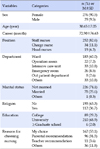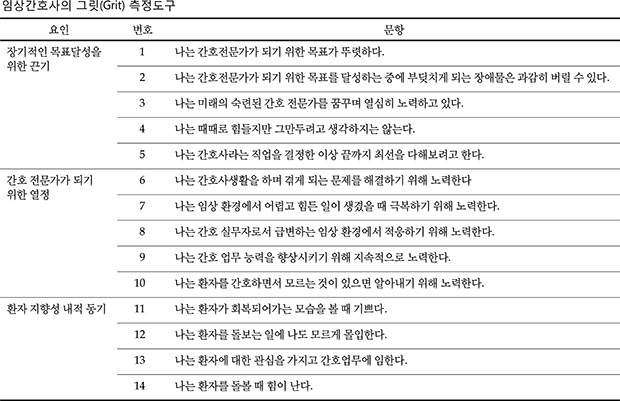Abstract
Purpose
The purposes of this study were to develop a scale to measure the grit for nurses and to examine the validity and reliability of the scale.
Methods
Through a literature review and focus group interviews, 28 preliminary items were selected. After a content validity examination by experts, 35 items were chosen. The questionnaire survey for this study was conducted with 330 nurses from five hospitals in A city in Korea. Among them, 305 met the inclusion criteria for analyses.
Results
From the exploratory factor analysis to determine validity, three factors were drawn. The variance explanation by the three factors was 56.62%, which means that the scale explained grit in clinical nurses. The three factors were labeled as ‘sustained persistence’ (5 items), ‘consistency of interest as a nursing professional’ (5 items), and ‘Patient oriented intrinsic motivation’ (4 items). The grit for criterion-related validity showed that the correlation coefficient was .53 (p<.001), validating the developed scale. For internal consistency, Cronbach's α coefficient was .91.
Figures and Tables
References
1. Lim HJ. The current state of Grit research and its need for reconceptualization. Korean Journal of Educational Psychology. 2017; 31(4):663–681. DOI: 10.17286/KJEP.2017.31.4.04.

2. Duckworth AL, Peterson C, Matthews MD, Kelly DR. Grit: perseverance and passion for long-term goals. Journal of Personality and Social Psychology. 2007; 92(6):1087–1101. DOI: 10.1037/0022-3514.92.6.1087.

3. Kim MS. OECD ESP longitudinal study of skill dynamics: validation of measures in Korea. Seoul: Korean Educational Development Institute;2014.
4. Credé M, Tynan MC, Harms PD. Much ado about grit: A meta-analytic synthesis of the grit literature. Journal of Personality and Social Psychology. 2017; 113(3):492–511. DOI: 10.1037/pspp0000102.


5. Bowman NA, Hill PL, Denson N, Bronkema R. Keep on truckin' or stay the course? Exploring grit dimensions as differential predictors of educational achievement, satisfaction, and intentions. Social Psychological and Personality Science. 2015; 6(6):639–645. DOI: 10.1177/1948550615574300.

6. Datu JAD, Valdez JPM, King RB. Perseverance counts but consistency does not! Validating the short grit scale in a collectivist setting. Current Psychology. 2016; 35(1):121–130. DOI: 10.1007/s12144-015-9374-2.

7. Kim JE, Lee SR, Yang SJ. A study of the characteristic of Korean grit: Examining multidimensional clustering of grit. Korean Journal of Culture and Social Issues. 2018; 24(2):131–151. DOI: 10.20406/kjcs.2018.5.24.2.131.
8. Shin M, Ahn DH. Comparisons of perceptions of success, grit, aspirations, and achievement goal orientation between gifted and non-gifted high school students. Journal of Gifted/Talented Education. 2015; 25(4):607–628. DOI: 10.9722/JGTE.2015.25.4.607.

9. Duckworth AL, Quinn PD. Development and validation of the short grit scale (Grit-S). Journal of Personality Assessment. 2009; 91(2):166–174. DOI: 10.1080/00223890802634290.


10. Datu JAD, Yuen M, Chen G. Development and validation of the Triarchic Model of Grit Scale (TMGS): Evidence from Filipino undergraduate students. Personality and Individual Differences. 2017; 114:198–205. DOI: 10.1016/j.paid.2017.04.012.

11. Jeong JY, Seo YS, Choi JH, Kim SH, Lee MS, Hong SH, et al. The influence of grit on turnover intention of university hospital nurses: the mediating effect of job involvement. Journal of Korean Academy of Nursing. 2019; 49(2):181–190. DOI: 10.4040/jkan.2019.49.2.181.


12. Lee IS, Joe SY, Kwon OY, Song J. Measuring grit of Korea armed forces nursing academy cadets. Journal of Military Nursing Research. 2018; 36(1):35–47. DOI: 10.31148/kjmnr.2018.36.1.35.

13. DeVellis RF. Scale development: theory and applications. 3rd ed. Thousand Oaks, CA: SAGE;2012.
14. Dumas J. Usability testing methods: Subjective measures Part II - Measuring attitudes and opinions. Common Ground. 1998; 8:4–8.
15. Polit DF, Beck CT, Owen SV. Is the CVI an acceptable indicator of content validity? Appraisal and recommendations. Research in Nursing & Health. 2007; 30(4):459–467. DOI: 10.1002/nur.20199.


16. Lee SR, Sohn YW. What are the strong predictors of academic achievement? - Deliberate practice and Grit. Korean Journal of School Psychology. 2013; 10(3):349–366. DOI: 10.16983/kjsp.2013.10.3.349.
17. Hair JF Jr, Black WC, Babin BJ, Anderson RE. Multivariate data analysis. 7th ed. Upper Saddle River, NJ: Prentice Hall;2010.
18. Ware JE, Snow KK, Kosinski M, Gandek B. SF-36 health survey: manual and interpretation guide. Boston: The Health Institute, New England Medical Center;1993.
19. Lee U, Lim SW, Shin YC, Shin DW, Oh KS, Kim SY, et al. Reliability and validity of Korean version of grit. Anxiety and Mood. 2019; 15(1):53–60. DOI: 10.24986/anxmod.2019.15.1.53.
20. Duckworth A. Grit: The power of passion and perseverance. London: Vermilion;2016.
21. Lee NY, Kim YS. Effects of relational bonds and professional authority in the organizational commitment of intensive care unit nurses. Journal of Korean Academy of Nursing Administration. 2017; 23(2):151–160.

22. Cho Y, Kim H, Kim E. Effects of grit and emotional intelligence (EI) on major satisfaction among nursing student. Health Service Management Review. 2018; 12(3):23–30. DOI: 10.18014/hsmr.2018.12.3.23.
23. Lee SK, Park SN, Jeong SH. Nursing core competencies needed in the fields of nursing practice for graduates in nursing. Journal of Korean Academy of Nursing Administration. 2012; 18(4):460–473. DOI: 10.11111/jkana.2012.18.4.460.

24. Jin JI, Kim NC. Grit, academic resilience, and psychological well-being in nursing students. Journal of Korean Academic Society of Nursing Education. 2017; 23(2):175–183. DOI: 10.5977/jkasne.2017.23.2.175.

25. Kim JH. Resilience and grit, driving force of achievement. Korea Enterprises Federation Monthly Webzine. 2015. 06. 15. p. 24–27.
26. Park AN, Chung KH, Kim WG. A study on the critical thinking disposition, self-directed learning readiness and professional nursing competency. Journal of Korean Academy of Nursing Administration. 2016; 22(1):1–10. DOI: 10.11111/jkana.2016.22.1.1.

27. Shin SH, Jang KS. The influence of emotional labor strategy on job burnout and job engagement in psychiatric nurses. Korean Public Health Research. 2016; 42(4):33–43.
28. Choi KS, Lee WS, Park YS, Jun MH, Lee SY, Park YW, et al. The relationship between cultural competency and the importance of nurses' qualities perceived by undergraduate nursing students. Journal of Korean Academy of Community Health Nursing. 2016; 27(2):163–172. DOI: 10.12799/jkachn.2016.27.2.163.

29. Toode K, Routasalo P, Helminen M, Suominen T. Hospital nurses' work motivation. Scandinavian Journal of Caring Sciences. 2015; 29(2):248–257. DOI: 10.1111/scs.12155.

30. Jung M. Influence of clinical nurses' intrinsic motivation, affective commitment, and turnover intention on organizational performance. Journal of the Korea Academia-Industrial cooperation Society. 2017; 18(11):594–601. DOI: 10.5762/KAIS.2017.18.11.594.




 PDF
PDF ePub
ePub Citation
Citation Print
Print









 XML Download
XML Download